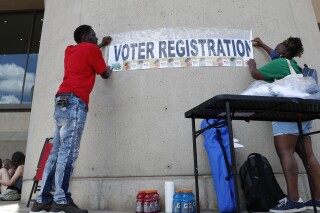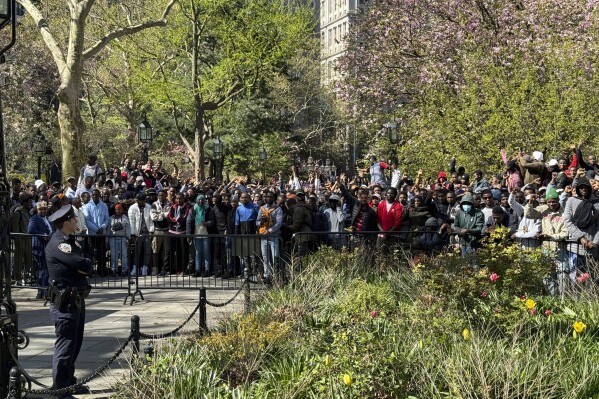Federal data does not show a soaring number of unauthorized migrants registering to vote

FILE - Aetry Jones, left, and Caerry Rigbon tape up a voter registration sign on Dallas City Hall before a Juneteenth 2020 celebration in Dallas on June 19, 2020. Social media users are falsely claiming that a “skyrocketing” number of unauthorized migrants are registering to vote in Arizona, Texas and Pennsylvania. (AP Photo/LM Otero, File)
CLAIM: Social Security Administration data shows the number of voters registering without a photo ID is skyrocketing in three key swing states, evidence that migrants who entered the country illegally are registering to vote in Arizona, Texas and Pennsylvania.
AP’S ASSESSMENT: False. Election officials in all three states said the information being shared is incorrect. In fact, recent voter registrations in those states are well below the numbers being cited online. The posts are misrepresenting data from the SSA’s Help America Vote Verification system, which tracks requests by states to verify the identity of individuals who registered to vote using the last four digits of their social security number. Only U.S. citizens can vote in federal elections and noncitizen voting is exceedingly rare, as states have processes to prevent it.
THE FACTS: With three months remaining in the presidential primary season, social media users are misrepresenting government data to suggest that the country is seeing a surge in voter registrations by migrants who came to the U.S. illegally.
“The number of voters registering without a photo ID is SKYROCKETING IN 3 key swing states: Arizona, Texas, and Pennsylvania,” reads one X post. It cites data from the SSA to claim that there have been 220,731 such registrations in Arizona; 1,250,710 in Texas; and 580,513 in Pennsylvania.
The post continues: “HAVV allows voters to register with a Social Security Number (4 digits). Illegals are not able to get licenses there. But they can get Social Security cards (for work authorization permits).” HAVV is the SSA’s Help America Vote Verification system.
As of Thursday, the post had received approximately 54,000 likes and 33,400 shares.
Others alleged outright that this data is proof that Democrats are rigging elections.
“Democrats are letting illegal immigrants through the border and registering them to vote using only their social security number,” a man says in a TikTok video shared on X, citing similar numbers. “This is how Democrats plan to stay in power.
But these claims misrepresent what the SSA data shows.
“This again appears to be an example of people who don’t understand how elections work misinterpreting data — perhaps intentionally, perhaps unintentionally — to create a false impression and inflate the potential for voter fraud,” David Becker, the founder and executive director of The Center for Election Innovation and Research, told The Associated Press.
The numbers being identified as individual voter registrations in Arizona, Texas and Pennsylvania are actually referencing the total number of requests states made to the SSA to verify voters’ identities from Dec. 31 to March 23.
Election officials in the three states noted that actual voter registration applications during that time period were much lower than the numbers being shared online.
Maricopa County, which makes up approximately 60% of Arizona’s voting population, has had 39,653 new registrants since the beginning of 2024, according to county recorder Stephen Richer. This is far below the 220,731 said to have registered with no photo ID.
In Texas, officials said in a statement that 57,711 people have registered to vote in Texas since the start of 2024, less than the number of people registered in the same period in 2022 and 2020. The state currently has approximately 17.9 million registered voters.
As of April 4, there had been more than 75,000 new voter registrations in Pennsylvania, according to Matt Heckel, a spokesperson for the Pennsylvania Department of State. There were approximately 8.7 million registered voters in the state on Monday.
Individuals in most states register to vote with either their driver’s license number, state ID number or the last four digits of their social security number. States use the first two options to verify the individual’s identity with their department of motor vehicles. This accounts for “the vast majority” of voters, according to Becker. A voter’s identity can be verified using the third option through the SSA’s HAVV system.
All verification requests for which the name, date of birth and last four digits of an SSN match with at least one SSA record are recorded by the agency under a “total matches” category.
HAVV requests are made for voters who are registering for the first time, but also if a voter submits an application after they move to a new state, or even within the same state, Becker said.
Officials in Arizona, Texas and Pennsylvania all confirmed that the number of transactions in the HAVV system does not represent what posts online are claiming it does.
“It is 100% false that there are 220,731 new registrants in Arizona since January 1, 2024 of suspect citizenship,” Richer told the AP.
Texas Secretary of State Jane Nelson wrote in a statement that “it is totally inaccurate that 1.2 million voters have registered to vote in Texas without a photo ID this year.”
Heckel told the AP that the HAVV data being cited on social media only represents the raw number of verification requests Pennsylvania counties make to the SSA, adding that “the data does not represent the numbers of newly registered voters, and any representation that they do is false.”
Heckel said that for Pennsylvania “in many cases, the same voter’s partial SSN is being checked more than once in a single year” and that the state makes HAVV requests for absentee and mail ballot applications in addition to voter registrations. This means that verification requests do not necessarily correspond one-to-one with people registering to vote.
A 2010 audit report published by the SSA’s Office of the Inspector General found that 32% of verification requests in 2008 — 2.4 million out of 7.7 million total — were for voters whose information had already been verified that year. In 2009, re-submissions constituted 20% of verification requests — 1.4 million out of 7.2 million.
Ohio, for example, in 2008 “submitted the same voter information 1,778 times during the year for a 77-year-old man who died in December 2005.” The submissions were made over an 11-day period, ranging from 1 to 278 verification requests per day. The same voter’s information was submitted by Ohio 13,824 times in 2009.
Federal law bans noncitizens from voting in federal elections, including races for president, vice president, the Senate and the House of Representatives. The 1996 law states that noncitizens who vote illegally will face a fine, imprisonment or both. Noncitizens who cast a ballot and get caught may also face deportation.
Voters are not required to provide proof of citizenship to vote in federal elections. However, they must confirm under penalty of perjury that they are U.S. citizens.
In Arizona, however, voters must prove they are citizens to cast a ballot in state and local races. If they do not provide proof, they are considered “federal only” voters. There are only 20,768 such voters in Maricopa County, according to Richer, out of more than 2.3 million active registered voters. He wrote in a post on X that the entire state only has about 30,000.
Arizona is currently the only state that enforces such a requirement. Voting Rights Lab, a nonprofit that tracks election-related legislation, reported last month that 11 other states are considering legislation that would require proof of citizenship to vote in state or local elections.
Federal law doesn’t stop states or municipalities from granting noncitizens the right to vote in local races — and a handful have, including 11 towns in Maryland and two in Vermont. Several states ban the practice.
Investigations show that noncitizen voting is exceedingly rare. For example, a Georgia audit of its voter rolls conducted in 2022 found fewer than 2,000 instances of noncitizens attempting to register to vote over the last 25 years, none of which succeeded. Millions of new Georgia voters registered during that time period.
Noncitizens may be eligible to receive a social security number if they are authorized to work in the U.S. or if they need one for another valid reason, such as to receive a certain benefit or service. But federal law requires states to regularly maintain their voter rolls and remove anyone ineligible, a process that identifies immigrants living in the country illegally in addition to other state-level vetting processes.
“It’s really unfortunate that there’s so many people who are trying to sow doubt into our elections process,” Aaron Thacker, a spokesperson for Arizona Secretary of State Adrian Fontes, told the AP in response to the claims spreading online.
___
This is part of the AP’s effort to address widely shared false and misleading information that is circulating online. Learn more about fact-checking at AP.


